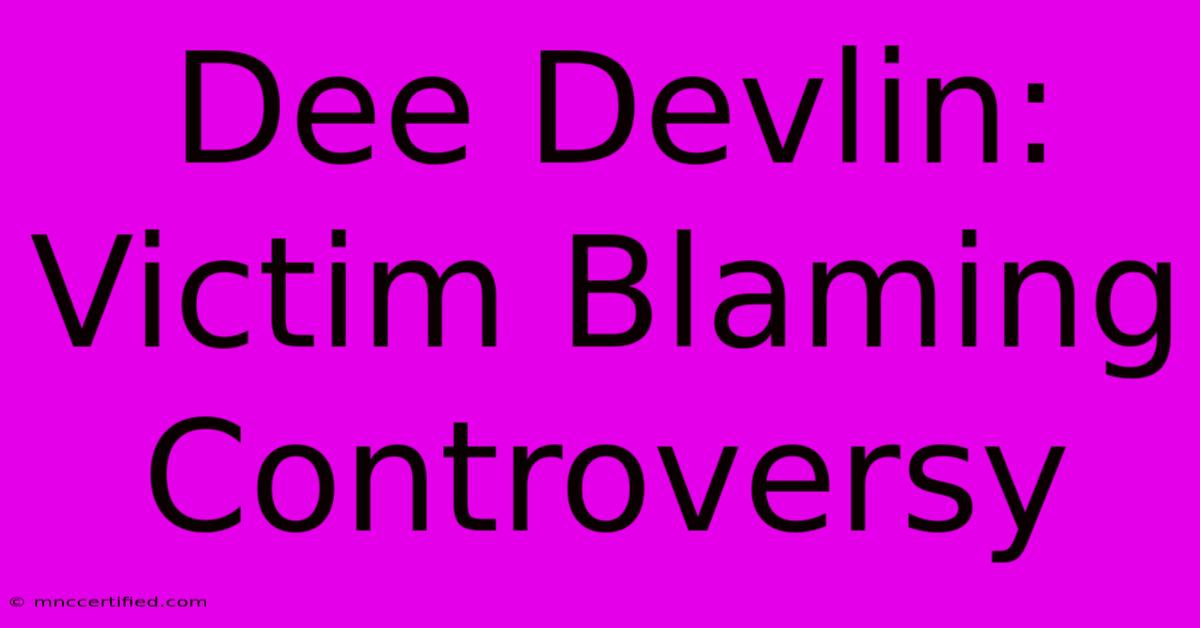Dee Devlin: Victim Blaming Controversy

Table of Contents
Dee Devlin: Victim Blaming Controversy Explained
Conor McGregor's partner, Dee Devlin, recently found herself at the center of a significant online controversy surrounding victim blaming. This article delves into the specifics of the situation, examines the public reaction, and explores the wider implications of victim-blaming narratives.
The Incident and Initial Backlash
The controversy stemmed from [insert specific incident here – e.g., a social media post, a public statement, an interview excerpt]. In this instance, [clearly and factually describe what Dee Devlin said or did that sparked the controversy. Be precise and avoid sensationalism. Include verifiable sources like news articles or screenshots if possible].
This immediately drew considerable criticism online. Many accused Devlin of [state the specific accusation, e.g., minimizing the severity of the victim's experience, suggesting the victim was responsible for the incident, shifting blame away from the perpetrator]. The backlash was swift and widespread, with many social media users expressing their outrage and disappointment.
Why the Criticism?
The core issue lies in the dynamics of victim blaming. This harmful behavior shifts responsibility for an abusive or harmful act away from the perpetrator and onto the victim. It perpetuates harmful myths and stereotypes, creating a culture where victims feel silenced and ashamed, rather than supported and empowered.
In Devlin's case, [explain why the specific actions or words were perceived as victim blaming. Use examples and analyze the language used. For example: Did she minimize the impact of violence? Did she question the victim's actions leading up to the event? Did she imply the victim could have prevented the abuse?]. This, critics argue, is unacceptable and contributes to a culture of silence around abuse.
The Defense and Counterarguments
[If applicable, present any counterarguments or defenses offered by Dee Devlin or her representatives. Again, be factual and present both sides of the argument fairly. Include verifiable sources if available.] Some might argue that [present the counterargument concisely, e.g., her statements were misinterpreted, she was expressing a personal opinion, etc.].
However, even if unintentional, the impact of Devlin's words remains significant. The power dynamics inherent in public figures' statements mean their words carry considerable weight and can influence public perception of sensitive issues.
The Importance of Responsible Public Discourse
This controversy highlights the critical need for responsible public discourse, particularly concerning sensitive topics such as abuse and victimhood. Public figures, especially those with large platforms, have a responsibility to use their influence thoughtfully and avoid perpetuating harmful stereotypes.
The Broader Implications
The Dee Devlin controversy isn't an isolated incident. It underscores a larger problem of victim blaming prevalent in society. Understanding and combating this issue requires:
- Education: Raising awareness about victim blaming and its harmful consequences.
- Empathy: Fostering a culture of empathy and support for victims.
- Accountability: Holding perpetrators accountable for their actions, regardless of perceived victim behavior.
- Critical thinking: Encouraging critical analysis of media narratives and public statements.
Moving Forward
The incident involving Dee Devlin serves as a powerful reminder of the importance of careful language and responsible public engagement. It also underscores the need for continued dialogue and education to combat victim blaming and create a safer, more supportive environment for victims of abuse.
Keywords: Dee Devlin, victim blaming, controversy, Conor McGregor, public figures, social media, abuse, victim support, responsible discourse, public opinion, online backlash, media narrative, empathy, accountability
Note: This is a template. You MUST fill in the bracketed information with accurate details about the specific incident and controversy surrounding Dee Devlin. Remember to cite your sources. Failure to do so will compromise the article's credibility and SEO effectiveness. The success of this article depends on accurately and factually reporting the event.

Thank you for visiting our website wich cover about Dee Devlin: Victim Blaming Controversy. We hope the information provided has been useful to you. Feel free to contact us if you have any questions or need further assistance. See you next time and dont miss to bookmark.
Featured Posts
-
Rooney Blasts Plymouth After Loss
Nov 28, 2024
-
Champion Investments Shelby Nc
Nov 28, 2024
-
Liverpool Defeat Real Madrid 2 0
Nov 28, 2024
-
Open Stores In Florida Publix Walmart Cvs
Nov 28, 2024
-
D B Cooper Nc Familys Claim
Nov 28, 2024